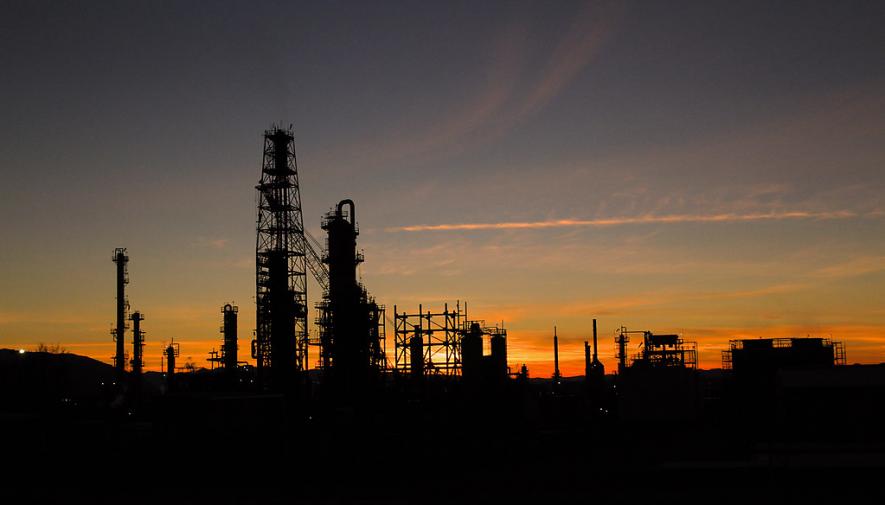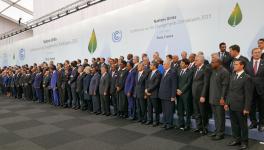Google-Aramco Greenwash Promotes Fossil Fuels

Image Courtesy: Flickr
Google CEO Sundar Pichaiwants a “carbon-free future” and has goaded the world to “act now” to “avert the worst consequences of climate change”. He even has a plan to tackle the company’semissions.
Two months after calling for efforts to reduce carbon emission last September, Google announced a joint venture (JV)with Saudi Aramcomaintainingthat the partnership was entirely green.
According to American non-profit news organisation, The Intercept, however, critics have questioned whether it’s possible to work with the Saudi Arabian public petroleum and natural gas giant without being complicit in the dirty business of fossil fuels.
“These efforts certainly sound like they are driven by the bottomline and not the desire to align businesses with carbon free investment,” Gregory Trencher, a professor of environmental studies at Kyoto University, told The Intercept.
“Not touching fossil fuels in any shape or form is generally expected by many divestment players.So, helping lower the carbon intensity of transport does not come across as a very impactful action.” Still, “methane leaks in existing infrastructure are very large source of anthropogenic methane emissions”, he added.
On the other hand, Johanna Neumann, a senior director with renewable energy advocacy group Environment America, believes that the “transition won’t happen overnight”.
“The sooner the world ditches gas and goes 100% renewable, the better it is for the environment and public health.But the transition won’t happen overnight,” he said adding that oil and gas companies “need to be held accountable for their methane pollution and the sooner they find and seal methane leaks, the better”.
Google spokesperson Ted Ladd defended the collaboration saying the partnership is meant to helpAramco “protect the environment”.
However, according to The Intercept, Ladd’s claim cuts to the heart of an ongoing debate on whether fossil fuel use should be made meaningfully cleaner through technology or does so-called decarbonisation only “greenwash” the irredeemable pursuit of fossil fuels that must be cast aside to preserve life on Earth?
Following the JV announcement, Google dispatched Thomas Kurian, head of the highly lucrative cloud-computing division, to deny allegations of climate hypocrisy.
Kurian told Bloomberg TVGoogle works with oil giants “but to the environmentally clean or green parts of these companies.We have said that again and again that we don’t work with the oil and gas division within Aramco”.
Within months of Kurian’s denial, the $6.7 trillion Aramco started using Google Cloud to transport methane, which is a leading source of emission when burned as fuel—more efficiently.
It was not a coincidence when Google Cloud hosted an “emissions hackathon” at the offices of Schlumberger, a Houston oil field services company, last November, the winning team comprised six Aramco oil and gas data scientists who’d devised a method of using Google Cloud’s machine learning features to detect and repair leaks in methane gas pipelines.
Google’s sophisticated cloud computing services will bring Saudi Arabia an estimated $10 billion market, according to The Intercept, through the construction of a vast data centre in Dammam, where Saudi oil was first discovered in 1938.
Apparently, Aramco has no interest in decarbonising itself. Climate scientists often criticise its green energy talk as a PR smokescreen obscuring its role as a contributor to climate change.
Pointing to a recent New York Times (NYT) investigation into Aramco, The Intercept said that it found the firm’s eco-friendly initiatives are aimed at keeping the planet addicted to Saudi fossil fuels for decades.
By reducing peripheral emissions, like methane leaks, Aramco gains the credibility needed to publicly pledge that it will stop emitting greenhouse gases by 2050, the investigation shows. “People would like us to give up on investment in hydrocarbons. But no,” Aramco CEO Amin Nasser told theNYT.
A 2022 report by Oil Change International reveals that Aramco greenlighted more new gas and oil projects than any other energy company last year and on way to become number three in expanding its oil and gas operations by 2025.
“Kurian’s statement that his team is ‘helping oil and gas companies decarbonise in a variety of ways’ is concerning on two levels,” Collin Rees, a senior campaigner with anti-fossil fuel group Oil Change International, told The Intercept.
“First, if so, they’re pretty bad at their jobs—because we’ve seen almost no meaningful decarbonisation in the sector—and second, it implies a continued existence for the sector or an ‘acceptable’ level of emissions, when we know that level must be near-zero,” Rees added.
Kelly Trout, research co-director at Oil Change Internationalsaid that working on ostensibly “green” projects for Aramco allows Google to pretend there is such a thing as eco-friendly fossil fuel. “The danger of what Google is doing lies in the company misleading the public that technology can render oil and gas ‘safe’ for the climate when only phasing it out can do that,” Trout said.
Simply put, Google might make Aramco’s operations more sustainable regarding withstanding public relations pressure, not emissions.
Moreover, Google Cloud is sold in the Saudi market via CNTXT, a regional middleman Aramco co-founded with a Norwegian software company that works largely with oil and gas firms. CNTXT’s website advertises “cloud-driven digital transformation solutions for public and private sectors and industrial digital transformation solutions asset-heavy industries, including oil and gas”.
A month after the hackathon, CNTXT CEO Abdullah Jarwan pitched Google Cloud at the Aramco 2022 Downstream Technology & Digital Excellence Awards, according to a LinkedIn post.
Defending the JV, Ladd said, “This is entirely consistent with the type of work Google Cloud does with energy companies—in this case, helping them track emissions and gas leaks to protect the environment. We are not working in the exploration and production business with energy firms.”
In fact, a landmark 2020 Greenpeace investigation accused Google of “helping Big Oil profit from climate destruction” pointing to its open courtship of upstream business.
Before 2019, a now-deleted section of Google’s website touted a variety of ways in which it had helped oil firms pump more oil, like Chevron using “Google’s AutoML Vision Al tools to parse Chevron’s vast data sets and revisit potential subsurface deposits that were previously passed over due to inconclusive or hard to parse data”.
After the Greenpeace report was published, Google claimed that it would not build custom artificial intelligence tools to aid drilling and pumping.
The company, however, is listed as a current member of the Open Subsurface Data Universe, a consortium of oil and tech companies that collaborate using data to improve oil and gas extraction. As of 2020, Google maintained a corporate email address specifically to field requests from consortium members, according to the OSDU’s official newsletter In The Pipeline.
To defend itself, Googlecarefullydistinguishes pumping of oil and gas out of the ground and moving them down the supply chain refined and then soldand eventually burned as fuel.
Josh Eisenfeld, of the environmental advocacy group Earthworks,termed the distinction a “fallacy”. “Anything that looks at a specific part of the production supply chain without looking at whole chain is perpetuating this disconnect that allows the chain to look cleaner than it is,” he told The Intercept in an interview.
“It’s like saying we don’t support the sale of tobacco but helping the transportation of it. You’re still helping that industry look better and exist longer than it should.”
Greenpeace campaigner Xueying Wu seconded Eisenfeld. “Google’s collaboration with Aramco works against the company’s climate commitments.”
It is “unclear how this effort would be separate from Aramco’s oil and gas business. It’s like eating organic food at home while collecting dividends from a pesticide business—there is a contradiction that is impossible to ignore.”
Kurian claimed Google “works with Aramco’s system integration division, not with the oil and gas division”. “We have said that again and again that we don’t work with the oil and gas division within Aramco.”
However, there’s no evidence of such a division with the term not visible on the company’s website.
Ladd said that Kurian was “referring to a division within Aramco”. Aramco’s media relations officethrough an unnamed spokesperson provided only a link to the company’s “digital transformation” webpage, which gives a loose overview of how the company uses various technologies to aid its oil and gas business.
Eisenfeld explained that the fundamental business of an entity like Aramco is “incompatible” with the scientific climate consensus. If Aramco wants to provide a “carbon-free future” for the planet of the kind Google is attempting internally, it will have to dismantle its pipelines, not simply keep them from leaking, he added.
“If you’re talking about decarbonising and not talking about decommissioning, you’re saying, ‘I’m going to drive the climate off a cliff,’” Eisenfeld said.
Get the latest reports & analysis with people's perspective on Protests, movements & deep analytical videos, discussions of the current affairs in your Telegram app. Subscribe to NewsClick's Telegram channel & get Real-Time updates on stories, as they get published on our website.





















